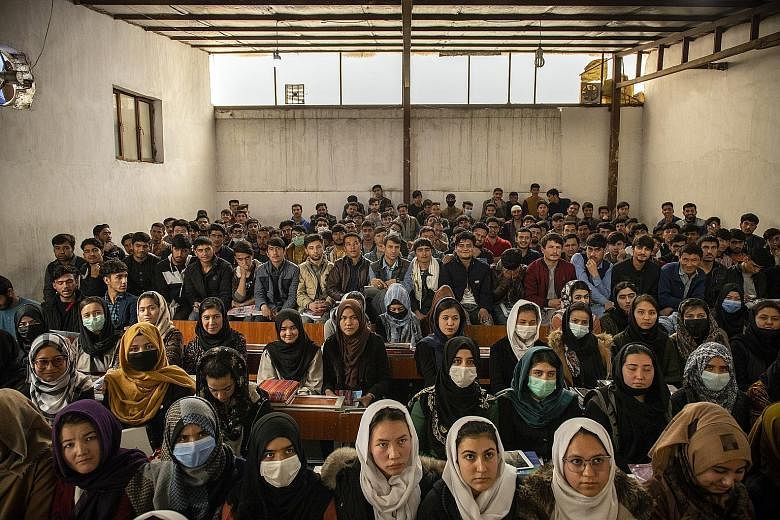KABUL • A female high school student in Kabul, Afghanistan's war-scarred capital, is worried that she will not be allowed to graduate. A pomegranate farmer in Kandahar wonders if his orchards will ever be clear of Taleban land mines. A government soldier in Ghazni fears he will never stop fighting.
Three Afghans from disparate walks of life, now each asking the same question: What will become of me when the Americans leave?
President Joe Biden on Wednesday vowed to withdraw all American troops by Sept 11, 20 years after the first Americans arrived to drive out Al-Qaeda militants harboured by the Taleban regime following the 2001 terrorist attacks in the United States.
The American withdrawal would end the longest war in US history, but it is also likely to be the start of another difficult chapter for Afghanistan's people.
"I am so worried about my future. It seems so murky. If the Taleban takes over, I lose my identity," said Wahida Sadeqi, 17, an 11th grader at Pardis High School in Kabul. "It is about my existence. It is not about their withdrawal. I was born in 2004 and I have no idea what the Taleban did to women, but I know women were banned from everything."
For two decades, US leaders have pledged peace, prosperity, democracy, the end of terrorism and rights for women. Few of those promises have materialised in vast areas of Afghanistan, but now even in the cities where real progress occurred, there is fear that everything will be lost when the Americans leave.
The Taleban, the extremist group that once controlled most of the country and continues to fight the government, insists that the elected president step down. Militias are increasing in prominence and power, and there is talk of civil war after the US withdrawal.
Afghans watched with cautious optimism when Mr Biden assumed office in January. Many had hoped he would reverse the Trump administration's rushed pledge to withdraw all US troops by May after brokering a shaky peace deal with the Taleban last year. Afghan leaders were convinced that Mr Biden would be a better ally who would not immediately withdraw the American troops.
Since the Afghan government and the Taleban began peace talks in Qatar late last year, fighting between them has surged, along with civilian casualties. On Wednesday, the United Nations' mission in Afghanistan reported that in the first three months this year, 573 civilians were killed and 1,210 wounded, a 29 per cent increase over the same period last year. Over 40,000 civilians have been killed since the start of the war.
Over two decades, the US mission evolved from hunting terrorists to helping the government build the institutions of a functioning government, dismantle the Taleban and empower women. But the US and Afghan militaries were never able to effectively destroy the Taleban, allowing the insurgents to stage a comeback.
Women would be most at risk under Taleban rule. When the group controlled Afghanistan from 1996 to 2001, it banned women from taking most jobs or receiving education and practically made them prisoners in their own homes.
In the countryside, fighting, poverty and oppression remain regular parts of life. Despite the challenges, residents found some comfort in knowing that Afghan forces, backed by the US military, were keeping the peace at least in some areas.
Mr Haji Abdul Samad, 52, a pomegranate farmer from the Arghandab district of Kandahar province, has been displaced from his home for two months because of the heavy fighting there.
"I am too tired of my life; we are now in a position to beg," Mr Samad said. "The Americans are responsible for the troubles, hardships that we are going through. Now they are going to leave with their troops, with no peace, no progress. They just want to leave their war behind."
Without US military support, Afghan government troops are up against a Taleban enemy who is frequently more experienced and better equipped than the average Afghan foot soldier.
"It is not the right time to withdraw their troops," said Major Saifuddin Azizi, a commando commander in the south-eastern province of Ghazni, where fighting has been especially brutal in recent days.
"It is unreasonable, hasty and a betrayal to us. It pushes Afghanistan into another civil war. Afghanistan's destiny will look like it did two decades ago."
NYTIMES

